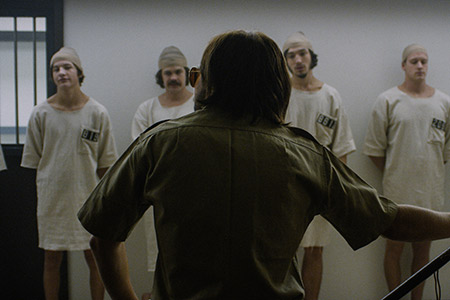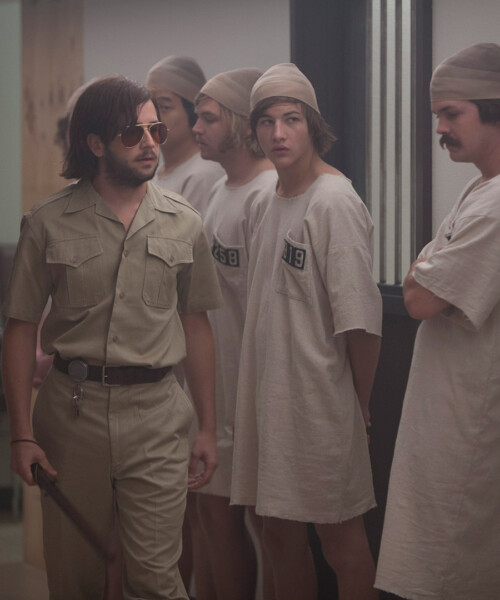The actual Stanford Prison Experiment, which divided 24 young men into “prisoners” and “guards” and studied what happened next, took place in 1971. Now, almost 45 years later a film on the study—The Stanford Prison Experiment, out this week—looks at what happened during that seven-day period and how it changed the men involved perhaps forever.
Here, stars Ezra Miller and Michael Angarano weigh in on the importance of the film and explain why watching it was more traumatic than making it.
It’s been a year since you finished filming, are you guys thrilled to be back together?
Ezra Miller: It’s great to recollect and reunite.
Michael Angarano: On the shoot we had something like 16 shooting days, so it went by really fast. There were days where we did seven to 10 pages a day. You know, it’s great to get back together because we just had such a great time.

A still from the film
So, a year later what stands out as being the most memorable part of your experience making this movie?
Miller: I consider this project a lot more thematically than experientially. Like, in thinking about what this project is about, it’s ever relevant. The idea of systemic disease, and bad apples versus problems with the barrel, this stuff comes up a lot.
Angarano: Also, it was just fun to have a group of 20 young guys who are usually competitive with each other able to collaborate on something, and create this really great vibe and energy on set. There was never any weird-ness, nobody ever took it too seriously, or too far. I remember certain moments where it was very theatrical, I almost felt like it was a play sometimes. There were moments when we stayed very close to the script, and others moments when Kyle, the director, would just let it roll. These line-ups would feel so realistic; those are so interesting to watch because I almost have no recollection of them.
Does working on something like this follow you when you’re done or make you look at things in a different light?
Angarano: It was a positive experience, so there’s no singular memory that I carry from the making of this film that feels like a trauma. The biggest trauma for me was watching the movie. I was way more disturbed by watching this film than I was by making it. But, I would say that when we see these stories in the news that are so frequent about abuses of power gone terribly wrong, I can never help but think about this experiment.
It struck me as a viewer that this experiment was done decades ago but we’re still dealing with the way power negatively affects people.
Angarano: It’s definitely to be noted that were not paying entirely close attention to the bindings of this experiment.
There’s no real time the lessons of this wouldn’t be relevant.
Miller: Exactly. It would be super dope in 2052.
Angarano: That’s when this movie is going to hit its peak of relevance, when everybody’s incarcerated by four dudes.
Does working on something that’s so intense take a toll on you as an actor?
Miller: I think when you’re working on something that you’re not passionate about as an artist, it’s suddenly work. But we don’t just work, we hang out and play. And this was that, we were able to play with some deeply dramatic material. I think it comes down to Kyle having cherry-picked a very amazing group of individuals.










































